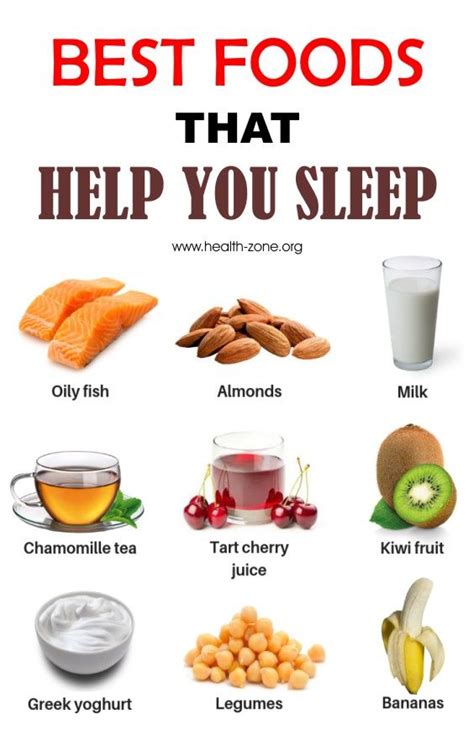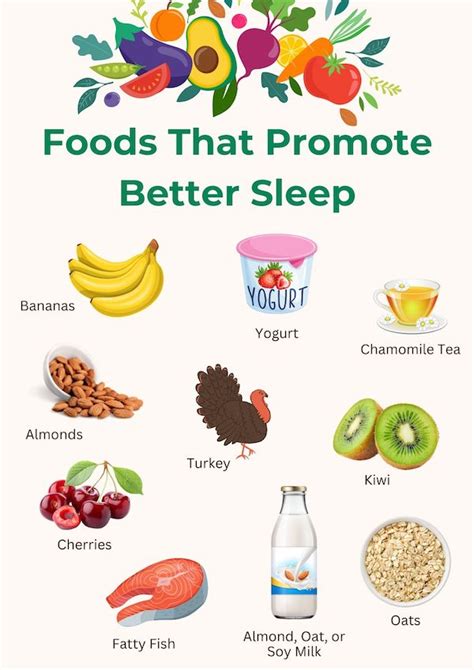Intro
Sleep is a vital aspect of our daily lives, playing a crucial role in our physical and mental health. During sleep, our bodies repair and rejuvenate themselves, and our brains process and consolidate memories. However, many people struggle with falling asleep or staying asleep, which can have negative consequences on their overall well-being. One way to promote better sleep is by incorporating sleep-conducive foods into our diets. Certain foods contain nutrients and compounds that can help regulate sleep patterns, making it easier to fall asleep and stay asleep.
A good night's sleep is essential for our bodies to function properly. When we sleep, our bodies repair and regenerate damaged cells, build bone and muscle, and strengthen our immune systems. Sleep also plays a critical role in our mental health, with research showing that sleep deprivation can lead to increased stress, anxiety, and depression. Furthermore, sleep affects our cognitive function, with lack of sleep impairing attention, memory, and decision-making skills. By consuming foods that promote sleep, we can improve the quality of our sleep and wake up feeling refreshed, revitalized, and ready to take on the day.
The relationship between food and sleep is complex, with different foods affecting our sleep patterns in various ways. Some foods can disrupt sleep, while others can promote it. Foods high in sugar, caffeine, and saturated fats can interfere with sleep, making it difficult to fall asleep or stay asleep. On the other hand, foods rich in nutrients like melatonin, serotonin, and tryptophan can help regulate sleep patterns. By understanding how different foods affect our sleep, we can make informed choices about our diets and promote better sleep.
Introduction to Sleep-Promoting Foods

Sleep-promoting foods are those that contain nutrients and compounds that help regulate sleep patterns. These foods can be incorporated into our diets to promote better sleep and improve overall health. Some of the key sleep-promoting foods include tart cherries, walnuts, and fatty fish. Tart cherries are a rich source of melatonin, a hormone that regulates sleep-wake cycles. Walnuts are a good source of tryptophan, an amino acid that is converted into serotonin and melatonin in the brain. Fatty fish like salmon and tuna are rich in vitamin B6 and magnesium, which can help promote relaxation and reduce stress.
Benefits of Sleep-Promoting Foods
The benefits of sleep-promoting foods are numerous. By incorporating these foods into our diets, we can improve the quality of our sleep, reduce stress and anxiety, and promote overall health and well-being. Sleep-promoting foods can also help regulate sleep patterns, making it easier to fall asleep and stay asleep. Additionally, these foods can help reduce symptoms of insomnia, sleep apnea, and other sleep disorders.Top Sleep-Promoting Foods

Some of the top sleep-promoting foods include:
- Tart cherries: rich in melatonin, which regulates sleep-wake cycles
- Walnuts: good source of tryptophan, which is converted into serotonin and melatonin in the brain
- Fatty fish: rich in vitamin B6 and magnesium, which can help promote relaxation and reduce stress
- Bananas: good source of potassium, which can help relax muscles and promote sleep
- Almonds: rich in magnesium, which can help reduce stress and promote relaxation
How Sleep-Promoting Foods Work
Sleep-promoting foods work by regulating sleep patterns and promoting relaxation. These foods contain nutrients and compounds that can help reduce stress, promote relaxation, and regulate sleep-wake cycles. For example, melatonin in tart cherries can help regulate sleep-wake cycles, while tryptophan in walnuts can be converted into serotonin and melatonin in the brain. Vitamin B6 and magnesium in fatty fish can also help promote relaxation and reduce stress.Incorporating Sleep-Promoting Foods into Your Diet

Incorporating sleep-promoting foods into your diet can be easy and delicious. Here are some tips:
- Eat a balanced diet that includes a variety of sleep-promoting foods
- Incorporate sleep-promoting foods into your meals and snacks
- Try to eat sleep-promoting foods in the evening, as they can help promote relaxation and reduce stress
- Avoid foods that can disrupt sleep, such as those high in sugar, caffeine, and saturated fats
Practical Tips for Better Sleep
In addition to incorporating sleep-promoting foods into your diet, there are several other practical tips for better sleep. These include: * Establishing a consistent sleep schedule * Creating a relaxing sleep environment * Avoiding screens and electronic devices before bedtime * Getting regular exercise, but not before bedtime * Practicing relaxation techniques, such as meditation or deep breathingConclusion and Final Thoughts

In conclusion, sleep-promoting foods can play a crucial role in promoting better sleep and overall health. By incorporating these foods into our diets and following practical tips for better sleep, we can improve the quality of our sleep and wake up feeling refreshed, revitalized, and ready to take on the day. Remember to eat a balanced diet, avoid foods that can disrupt sleep, and establish a consistent sleep schedule. With a little practice and patience, you can improve your sleep and overall health.
What are some common sleep disorders?
+Some common sleep disorders include insomnia, sleep apnea, restless leg syndrome, and narcolepsy.
How can I establish a consistent sleep schedule?
+Establishing a consistent sleep schedule involves going to bed and waking up at the same time every day, including weekends. This can help regulate your body's internal clock and improve the quality of your sleep.
What are some relaxation techniques that can help with sleep?
+Some relaxation techniques that can help with sleep include meditation, deep breathing, progressive muscle relaxation, and yoga. These techniques can help reduce stress and promote relaxation, making it easier to fall asleep and stay asleep.
We hope this article has provided you with valuable information on sleep-promoting foods and practical tips for better sleep. If you have any questions or comments, please don't hesitate to share them with us. We would love to hear from you and help you improve your sleep and overall health. Share this article with your friends and family, and let's work together to promote better sleep and overall well-being.
